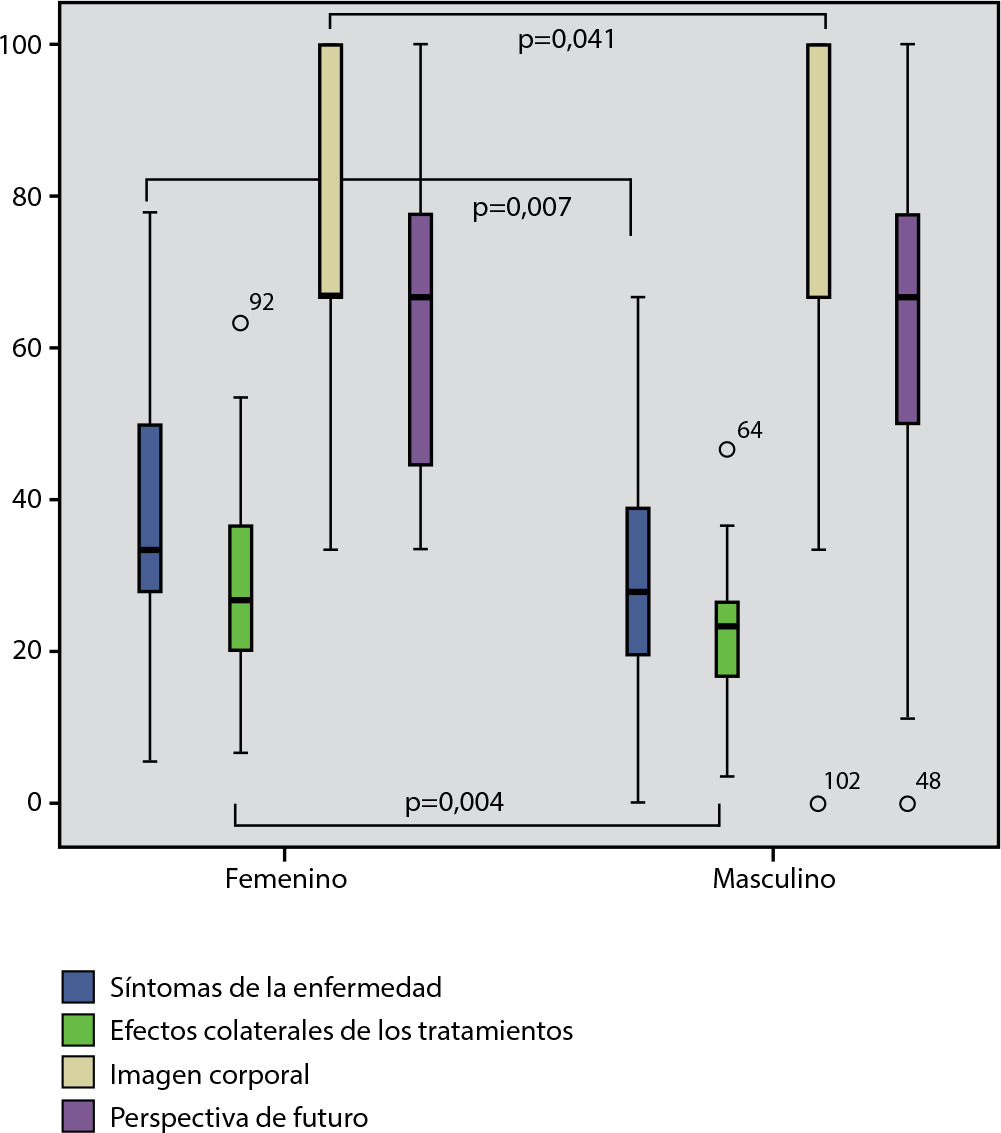-
ORIGINAL ARTICLE
Psychometric properties of the Chilean version of the quality of life questionnaire for multiple myeloma
Revista Brasileira de Enfermagem. 2024;77(1):e20230100
03/05/2024
Resumo
ORIGINAL ARTICLEPsychometric properties of the Chilean version of the quality of life questionnaire for multiple myeloma
Revista Brasileira de Enfermagem. 2024;77(1):e20230100
03/05/2024DOI 10.1590/0034-7167-2023-0100
Visualizações0Ver maisABSTRACT
Objectives:
To evaluate the internal consistency and construct validity of the QLQ-MY20 for assessing the quality of life in multiple myeloma survivors in Chile.
Methods:
This was a cross-sectional study conducted between March 2020 and December 2022. It involved 118 individuals from two public hospitals. The QLQ-C30 and QLQ-MY20 questionnaires were used. Internal consistency was assessed using Cronbach’s alpha(α), and construct validity was evaluated through hypothesis testing (Mann-Whitney and Spearman correlation).
Results:
The average age of participants was 67.2 years (SD=9.2). Internal consistency for the complete scale was α=0.779, for the “disease symptoms” dimension α=0.671, for the “side effects of treatments” dimension α=0.538, and for the “future perspective” dimension α=0.670. Four of the five construct validity hypotheses were confirmed: women, individuals with worse performance status, those with pain, and those with worse fatigue showed more symptoms.
Conclusions:
The Chilean version of the QLQ-MY20 demonstrates adequate internal consistency and construct validity.

-
ORIGINAL ARTICLE
Psycho social risks noted by oncology workers related to their quality of life
Revista Brasileira de Enfermagem. 2019;72(4):854-860
19/08/2019
Resumo
ORIGINAL ARTICLEPsycho social risks noted by oncology workers related to their quality of life
Revista Brasileira de Enfermagem. 2019;72(4):854-860
19/08/2019DOI 10.1590/0034-7167-2017-0833
Visualizações0Ver maisABSTRACT
Objective:
To analyze the relation between occupational psychosocial risks and quality of life related to health, felt by workers who work in oncology and palliative care units in a region of Chile.
Method:
Cross-sectional analytical study of quantitative approach, in which 110 health workers participated. Research met the ethical requirements of E. Emanuel.
Results:
Participants perceive greater exposure to psychosocial risks in the dimension of psychological demands and double presence. On the other hand, they see better results in the physical health component (: 76.72; SD 9.75) versus the mental health component (: 71.13; SD 6.38). In addition, there are relations with statistical significance, between psychosocial risks and quality of life related to Health (p≤0.05).
Conclusions:
This study shows that there the perception of psychosocial risks and quality of life are related, when considering the health of workers.
-
RESEARCH
Nutritional status and factors associated with non-institutionalized people over 75 years of age
Revista Brasileira de Enfermagem. 2018;71(3):1007-1012
01/01/2018
Resumo
RESEARCHNutritional status and factors associated with non-institutionalized people over 75 years of age
Revista Brasileira de Enfermagem. 2018;71(3):1007-1012
01/01/2018DOI 10.1590/0034-7167-2017-0207
Visualizações0Ver maisABSTRACT
Objective:
to determine the factors related to the risk of malnutrition in a non-institutionalized population over 75 years of age.
Method:
a cross-sectional study was conducted using a questionnaire in a sample of 326 individuals over 75 years of age in Castellón (Spain), during 2015, and selected through intentional sampling.
Results:
Malnutrition prevalence was 2.8%. 26.9% of the individuals were at risk of malnutrition, whereas women presented a higher rate (31.5%). Women with a good overall health status showed a lower rate than men, 55% and 69%, respectively. Individuals that showed a lower risk of malnutrition are those with a positive perception than those who have a good overall health. Frail elderly people showed a higher risk of malnutrition (57.5%) compared to non-frail subjects (20.2%) p< 0.001.
Conclusion:
Frail women, self-assessed health, overall health, and use of health care services (nursing consultation) were related to a higher risk of malnutrition.



